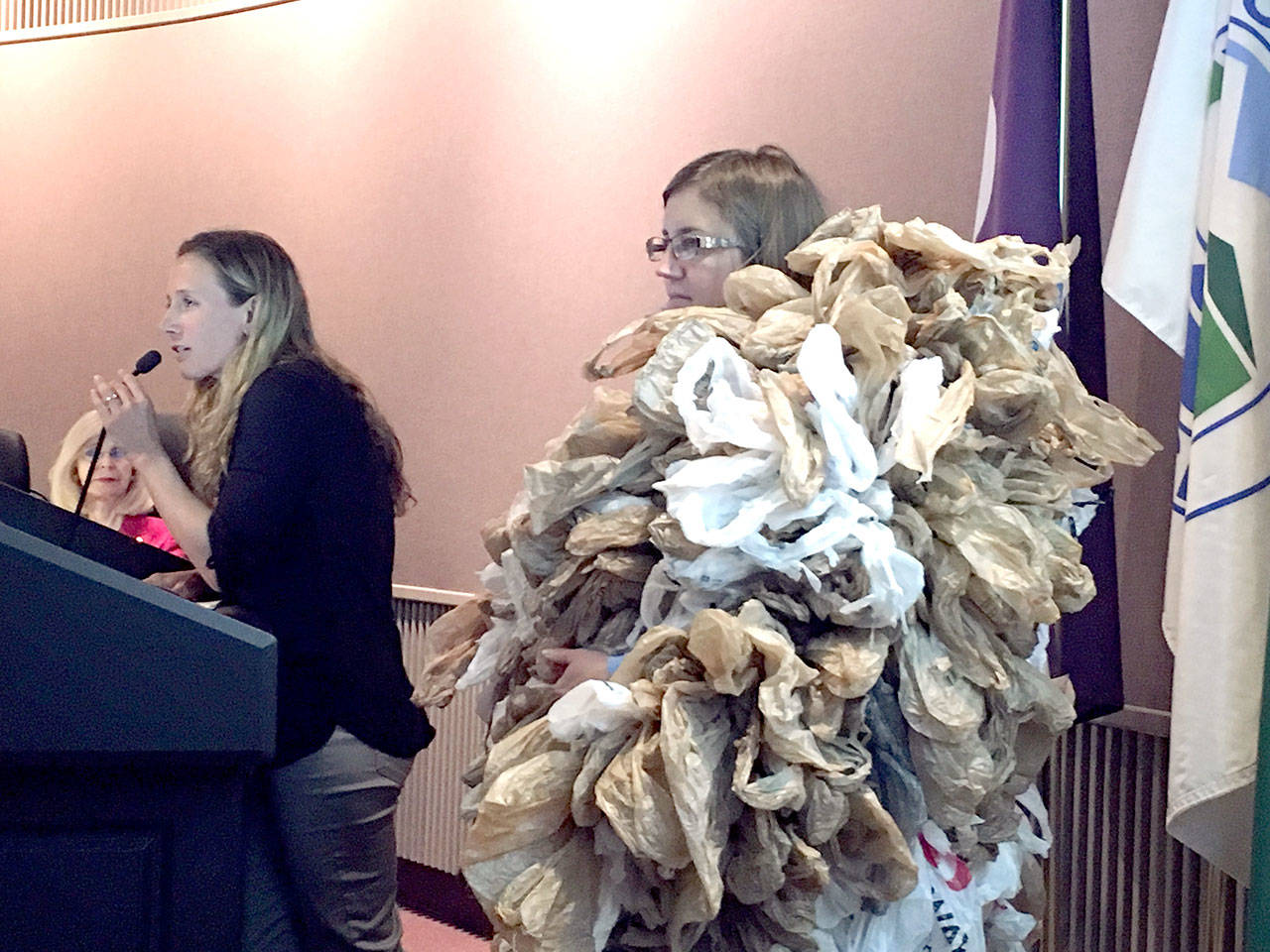PORT ANGELES — Let the plastic bag debate begin.
The Port Angeles City Council voted 5-2 Tuesday to direct staff to develop a proposal to ban plastic bags at stores within the city limits.
The council will consider the ordinance after holding two public hearings on dates to be determined.
A first reading of the ordinance is tentatively scheduled for March 6, City Clerk Jennifer Veneklasen said Wednesday.
“We’re not going to be able to solve all aspects of this debate with one City Council meeting,” Councilman Mike French said Tuesday.
“This is a bigger debate. I definitely want to see this come back so that we can have an open public forum so people can have their say on both sides.”
Fourteen jurisdictions in the state, including Port Townsend, have adopted ordinances that restrict merchants’ use of plastic bags, Heather Trim, Zero Waste Washington executive director told the council.
“We recommend minimal enforcement, that you put enforcement in the law but that it happens over time,” Trim said.
“You’re letting the retailers kind of get used to it, you’re letting the community get used to it and there’s not a sort of a nasty, big thing that starts right up front.”
Melinda Gelder, founder of Port Angeles Plastic Reduction Coalition, said 8 million metric tons of plastic ends up in world oceans every year, causing harm to marine life and aesthetic values.
“If you travel the world, if you talk to scientists, if you see what’s going on you know this is not some hippie fad sidebar issue,” Gelder said.
“This is a big concern for our world.”
Six of nine speakers who addressed the issue in two public comment periods said they would support a plastic bag prohibition.
Gelder was joined in her presentation by Kim Sager-Fradkin, who wore a “Plastic Bag Monster” costume containing 500 plastic bags to represent the number of plastic bags that the average American throws away every year.
“That’s a lot of bags,” Gelder said.
“And again, these are often used one time and then disposed of, most of which end up in our oceans.”
Gelder said a plastic bag ordinance would help motivate people to reduce plastic waste and serve as a model for other jurisdictions.
As a coastal community that sits near a national park and national marine sanctuary, Gelder said it is “vital” that Port Angeles take steps to curb plastic pollution.
“It is an issue in our town, and it’s a significant one,” Gelder said.
Councilmembers Cherie Kidd and Jim Moran voted against Deputy Mayor Kate Dexter’s motion to direct staff to draft a plastic bag ordinance.
“I believe education comes before legislation,” Kidd said.
Kidd recalled the successful “shop local” campaign that was championed by a past council.
“I think that we should produce a campaign to reduce the use of plastic bags,” Kidd said.
“It’s very important that we have an education component in anything we do moving forward.”
Moran displayed a paper grocery bag from Safeway.
“I asked for it and they gave it to me,” Moran said.
“No problem. There wasn’t any ordinance required for me to ask that, and there was no ordinance required for them to provide me this paper bag.”
Moran, who cited several studies in his remarks, said plastic bags are 40 times cheaper to produce than paper bags.
“Not only would the store be obligated to pass this (cost) along, but this would also would put an extreme, I think, additional burden on our small businesses that would have to comply with supplying this (paper) material as opposed to this,” Moran said.
Sixty-four percent of reusable cloth grocery bags tested in one study contained bacteria, and 97 percent of the bags had not been washed, Moran said.
“Does the word cross contamination mean anything to anybody?” Moran said.
“There is no bacteria ever found in these plastic bags.”
Moran said an alternative to the ordinance would be to encourage recycling.
“I’m not convinced of the need to impose an ordinance on our citizens who have, I believe, enough good judgment to recycle their bags,” Moran said.
Councilman Michael Merideth countered that education has not stopped people from littering.
“If you’re not educated enough to know that you don’t throw your garbage out the window of your car, I’m not sure that educating people on plastic bags is going to work,” Merideth said.
A wider distribution of paper grocery bags, Merideth added, would help raise the demand for left-over forest products that must be removed from logging sites.
Citing his own experience, Merideth said plastic grocery bags usually “don’t hold up” for more than one use.
“There’s a reason why they put two items in those plastic bags,” Merideth said, “because they’re junk.”
French said the aesthetics of plastic bag pollution was a “really underappreciated point.”
“We are a community that relies heavily on tourism,” French said.
“One big benefit of this (ordinance) is showing people that are coming to our area that we value the environment and we value our area, we value the beauty. And if means that our lives are a little less convenient, that’s fine.”
French agreed that education would be “big part” of the discussion.
“I think that we need to have the education on both sides,” Mayor Sissi Bruch said.
“I am grateful for this discussion.”
Stores in most cities and counties that have plastic bag laws charge five cents to use a paper bag, Trim said.
“It’s not a tax,” Trim told the council.
“It’s a fee that goes to the store to offset their costs. And because there’s a social equity concern, the idea is that you do exempt people who are on food programs so that they do not have to pay the fee.”
________
Reporter Rob Ollikainen can be reached at 360-452-2345, ext. 56450, or at rollikainen@peninsuladailynews.com.

